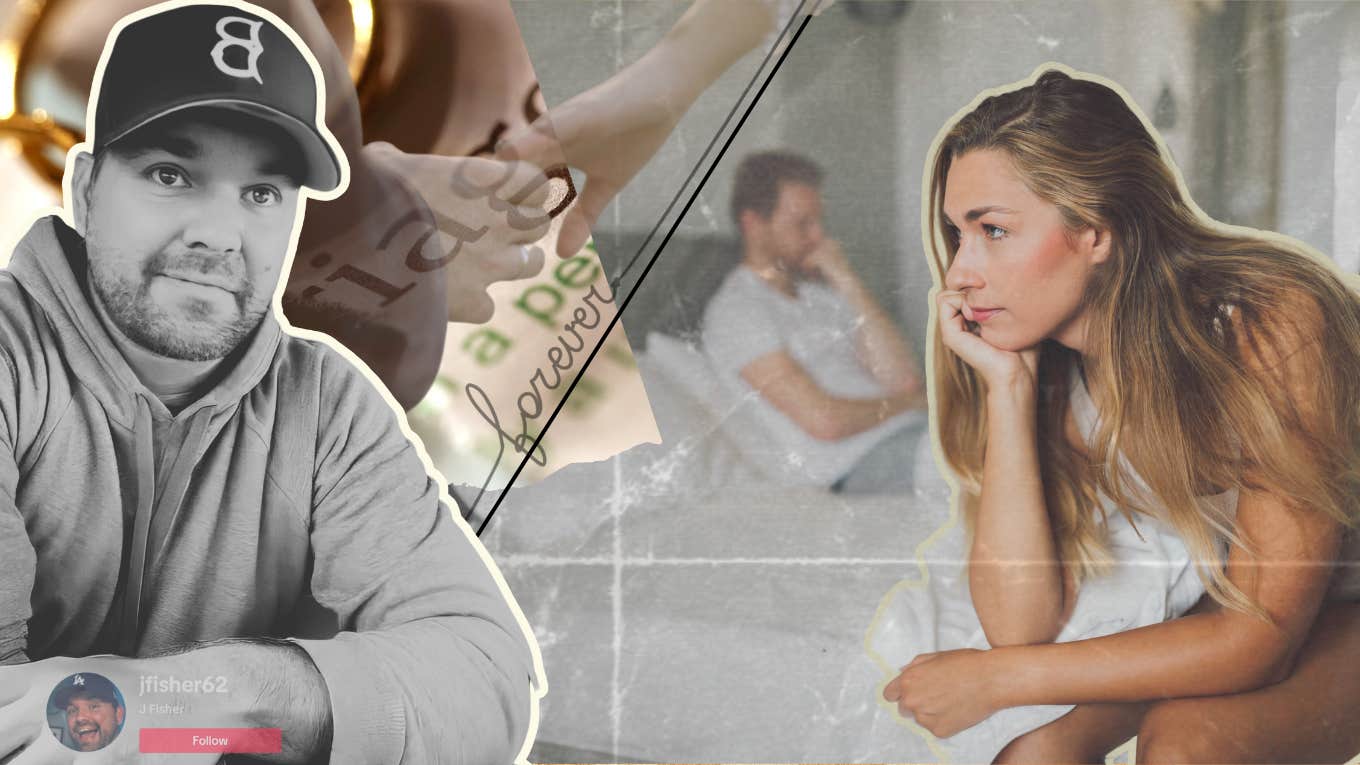Man Says The Idea Of 'Two Becoming One' Is A 'Bait & Switch' That's Ruining Marriages
Why try to better yourself or work on your marriage when you've disappeared into your partner?
 @Jfisher62 / TikTok, nd3000, Daria Obymaha, Kameleon007 | Canva
@Jfisher62 / TikTok, nd3000, Daria Obymaha, Kameleon007 | Canva The idea of "two becoming one" in marriage is so embedded in our culture that it shows up in all kinds of ways, from the lighting of the "unity candle" at the wedding to referring to partners as our "other half." Heck, the Spice Girls even famously wrote a (very good) song about it back in the 90s.
But is merging yourself entirely with another person healthy? Can you even be a good partner to someone else if your own self is subsumed? One man online thinks not, especially where men are concerned.
He says the idea of two becoming one forever is a 'bait and switch' that is wrecking marriages.
TikToker J Fisher, also known as @jfisher62 on the app, recently dug into this topic while discussing what he's learned from his own marital difficulties. And as a former evangelical Christian trying to work through the ways religion and our patriarchal culture have impacted him as a husband, Fisher takes issue with the idea of "two becoming one" once they walk down the aisle.
Fisher explained that he was raised with the "Christian fundamentalist worldview" that marriage is not only the merging of two people into one, but it also should last forever. "Those ideas, especially when unchallenged, aren't only lacking, but they can be toxic," explained.
Fisher feels the notion of marriage being 'forever' gives people license to take their partners and relationships for granted.
Fisher described the traditional idea of marriage being a lifelong commitment as essentially turning into an excuse to avoid working on the relationship and for the people in it to avoid working on themselves. "The idea that divorce is not an option in a marriage leads people to start to prioritize the institution over the relationship," Fisher said.
He described how particularly, as an anxious person, the notion of a forever partnership was especially enticing to him for the comfort it provides. "I'd have this person I love who's not going anywhere," he said.
If that sounds a lot like taking his wife for granted, that's not coincidental. Fisher says he did just that, because he took "forever" to mean that he had "unlimited time" to fix any problems in his marriage.
"'Marriage forever' sends the message that marriage is never for today," he bluntly put it. And this notion is the bedrock of what he calls the "bait and switch" of traditional ideas about marriage.
Fisher says the idea of two becoming one leads partners, and especially men, to look exclusively to their spouse for validation.
"Truth is, as soon as we got married, I no longer saw her as external," Fisher said. "I saw her as an internal source, an extension of myself." That's problematic in and of itself, of course — it's pretty much one of the definitions of codependence, after all.
But in Fisher's case it exacerbated an even bigger problem — the lack of work he'd done on himself before marriage. "Because I didn't know how to love myself, in turn, I also didn't know how to love her," he said. "I would have said back then that I trusted her, I would have said I loved her with my whole heart."
But he says there were times when he could tell his wife didn't fully believe him, adding, "I was lacking self-insight and reflection to such an incredible extent."
This lack of what he calls "self-insight," in turn, led to even bigger problems — "an overconfidence bias" with regards to the skills he brought to the partnership as well as "an optimism bias" that gave him a false security that he and his wife would never end up divorced.
"The danger in thinking that something cannot happen to you," Fisher went on to say, "is that you do almost no preparation to avoid that outcome."
Experts say that Fisher is definitely onto something with his perspective on our long-held ideas about marriage.
Psychologist Kelly Ann Garnett told us that seeking validation in a partner is in fact one of the key indicators you're not ready to be in a serious relationship in the first place. It also indicates that you don't love yourself enough to truly be there for a partner.
And as for the idea of two becoming one? Well, many experts say that maintaining a sense of individuality is actually a make-or-break asset when it comes to a healthy marriage. So it's probably time for us to update our tried-and-true views of how marriage should work.
And leave the "two become one" stuff to the Spice Girls from here on out.
John Sundholm is a news and entertainment writer who covers pop culture, social justice and human interest topics.
